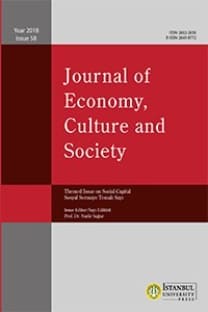Online Distance Learning During Covid-19 Pandemic: An Empirical Analysis Over the Students’ Opinions
Online Distance Learning During Covid-19 Pandemic: An Empirical Analysis Over the Students’ Opinions
The COVID-19 Pandemic has changed areas of societal life to a great extent. Educational fronts are one of them as well. Self-isolation has caused the lock down of educational facilities and it led to the rise of online distance learning worldwide. With its pros and cons this method has been used for more than one year. In this regard, the study used a detailed survey to collect the opinions of Turkish higher education students about the e-learning process during the spring term 2020 when the COVID 19 Pandemic began. For this purpose, 750 surveys were conducted over Google Forms with participant of higher education students from Turkey. The results of the research revealed the following findings. The majority of the participants stated that although distance education had some advantages, it was not a substitute for traditional education, and they could not achieve the same efficiency. The main reasons for this conclusion were inadequate infrastructure, internet access problems and unfair competition caused by the lack of computer hardware, especially in the ongoing education throughout the country. Students also stressed the significance of online education and how it helped them to stick to their academic careers as they had no alternative other than following an online education system in the social isolation period of COVID-19 measures.
___
- Abbasi, S., Ayoob, T., Malik, A., & Memon, S. I. (2020). Perceptions of students regarding e-learning during Covıd-19 at a private medical college, Pak J Med Sci, May 2020, 36 (No. Covıd 19-4), 57–61.
- Aboagye, E., Yawson, J. A., & Appiah, K. N. (2020). Covıd-19 and e-learning: The challenges of students in tertiary ınstitutions, Social Education Research, 1(2), 109–115.
- Alipio, M. (2020). Education during Covıd-19 era: Are learnens in a less-economically developed country ready for e-learning?, ZBW- Leibniz Information Centre for Economics, Kiel, Hamburg, 1–16.
- Almaiah, M. A., Al-Khasawneh, A., & Althunibat, A. (2020). Exploring the critical challenges and factors ınfluencing the e-learning system usage during Covid-19 pandemic, Education and Information Technologies, Springer Science and Business Media, 1–20.
- Baig, Qaiser A., Zaidi, S. J. A., & Alam, B. F. (2019). Perceptions of dental faculty and students of e-learning and its application in a public sector dental college in Karachi, Pakistan, Journal of Pak Med Assoc, JPMA, 69(09), 1319–1324.
- Chavarria-Bolanos, D., Gomez-Fernandez, A., Dittel-Jimenez, C. & Montero-Aguilar, M. (2020). E-learning in dental schools in the times of Covid-19: A review and analysis of an educational resource in times of the Covıd-19 pandemic, International Journal of Dental Sciences, Odovtos, 208–224.
- Chiu-Lan, C., & Ming, F. (2020). Journal of physics.: Conference Series 1574, 012166, pp. 1–6.
- Cucinotta, D., & Vanelli, M. (2020). WHO declares Covid-19 a pandemic, Acta Biomed 2020, 91(1), 157–160.
- Huang, R.H., Liu, D.J., Tlili, A., Yang, J.F., & Wang, H.H. (2020). Handbook on facilitating flexible learning during educational disruption: The chinese experience in maintaining undisrupted learning in Covıd-19 outbreak. Beijing: Smart Learning Institute of Beijing Normal University, Beijing, Chıne
- Ichsan, İ. Z., Rahmanyati, H., Purwanto, A., Sigit, D. V., & Rahman M. (2020). Peb-Covid-19: Analysis of students behavior and Ilmızı model in environmental learning, Jurnal Iqra, 5(1), 1–11.
- Lestiyanawati, R., & Widyantoro, A. (2020). Strategies and problems faced by Indonesian Teachers in conducting e-learning system during Covıd-19, Cllınet Journal (Journal of Culture, Literature, Linguistics and English Teaching), 2(1), 71–82.
- Mensah, E. A., White, K. R., Yankey, B., & Self Brown, E. (2020). Covıd-19 and distance learning: Effects on georgia state university school of public health students, Frontiers in Public Health, 1–10.
- Owusu-Forjour, C., Koomson, C.K., & Hanson, D. (2020). The ımpact of Covıd-19 on learning the perspective of the ghanaian student, European Journal of Education Studies, 7(3), 88–101.
- Radha, R., Mahalakshmi, K., Kumar, S., & Saravanakumar, R. (2020), E-learning during lockdown of Covıd-19 pandemic: A global perspective, International Journal of Control and Automation, 13(4), 1088–1099.
- Sohrabi, C., Alsafi, Z., O’Neill, N., Khan, M., Kerwan, A., Al-Jabir, A., Iosifidis, C., &Agha, R. (2020). World health organization declares global emergency: A review of the 2019 novel coronavirus (Covıd-19), International Journal of Surgery, (76), 71–76.
- Srinivasan, D. K. (2020). Medical student’s perceptions and an anatomy teacher’s personal experience using an e-learning platform for tutorials during the Covıd-19 crisis, Letter to the Editor, Anatomical Sciences Education, American Association of Anatomy, (13), 315–316.
- Turkish Higher Education Institution (YÖK) (2021). Pandemi sürecinde online eğitimin verimliliğine ilişkin öğrenci anket raporu, ‘’Yok Anket Raporu.pdf (ozal.edu.tr)’’, Access Date: July 14, 2021.
- www.weforum.org, “The Covıd-19 pandemic has changed education forever. this is how, https://www.weforum.org/ agenda/2020/04/coronavirus-education-global-covid19-online-digital-learning , Access Date: July 7th, 2020.
- Yamamoto, G. & Telli A., D. (2020). Coronavirüs ve çevrimiçi (Online) eğitimin önlenemeyen yükselişi, Üniversite Araştırmaları Dergisi, 3(1), 25–34.
- Yıldırım, S., Yıldırım, G., Çelik, E., & Karaman, S. (2014). Uzaktan eğitim öğrencilerinin uzaktan eğitime yönelik görüşleri: Bir ölçek geliştirme çalışması, Eğitim ve Öğretim Araştırmaları Dergisi Journal of Research in Education and Teaching, 3(3), 365–370.
- Turkish Higher Education Institution, (YÖK) (2021). https://www.yok.gov.tr/HaberBelgeleri/Haber%20 %c4%b0%c3%a7erisindeki%20Belgeler/Dosyalar/2021/ogrenci-anket-sonuclari.pdf , Access Date: 12.05.2021
- ISSN: 2602-2656
- Yayın Aralığı: Yılda 2 Sayı
- Başlangıç: 1960
- Yayıncı: İstanbul Üniversitesi Yayınevi
Sayıdaki Diğer Makaleler
Online Distance Learning During Covid-19 Pandemic: An Empirical Analysis Over the Students’ Opinions
Gökçe CEREV, Özgür TOPKAYA, Abdurrahman BENLİ
Experimental Research on Gifted Students and Social Media Communication Competence Program
Kadriye KOBAK, Naif KARA, Aslı İGİT
Murat OLGUN, Erkan ARI, Veysel YILMAZ
Budgetary Vat Refund to Agricultural Producers: Analysis of National Tax and Customs Legislation
Yuriy LUPENKO, Svitlana ANDROS, Andriy LUPENKO, Yurii YARMOLENKO
Problem Solving and Personality in Security Officers
Halim İŞSEVER, Elif EZİRMİK, Gözde ÖZTAN, Nefise ŞEKER, Zeynep Betül SAĞLAM, Fatma CANATAR
